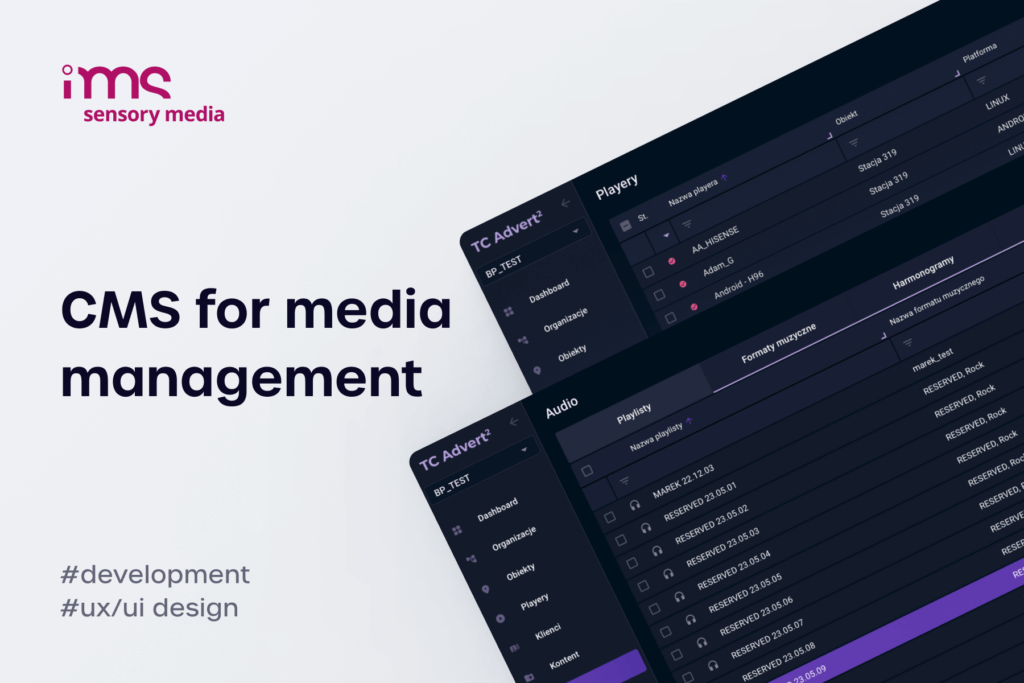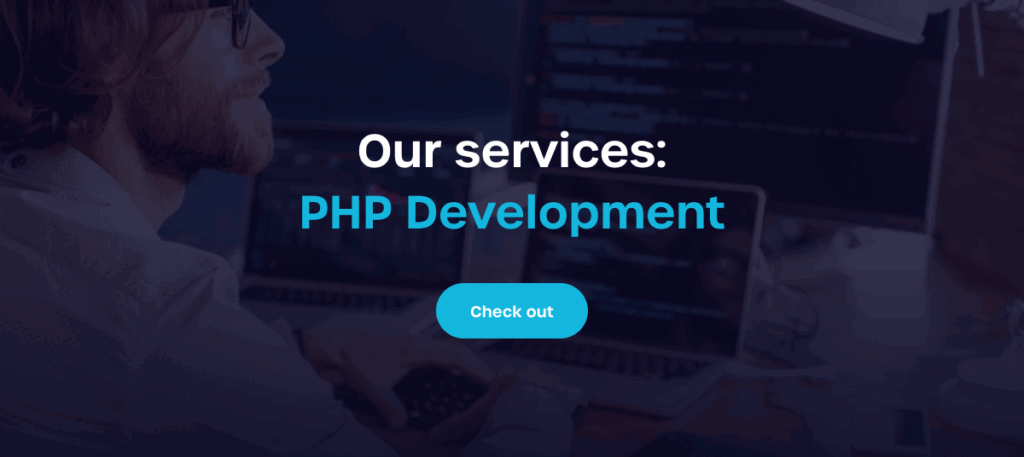PHP development has been a cornerstone of the web for decades, powering some of the world’s most popular platforms and applications. According to W3Techs, PHP is used by 73.6% of all the websites whose server-side programming language we know, which shows just how dominant it remains in 2026. From content management systems like WordPress to complex business portals, ERPs and e-commerce stores, PHP continues to provide a reliable foundation for web solutions.
Its popularity comes from a unique mix of flexibility, cost-effectiveness, and a vast community of developers who keep the language evolving. For businesses considering building a new application or modernizing an existing one, PHP development offers a proven path with long-term stability. In this article, we’ll explain what PHP development is, explore its benefits, and highlight the most common use cases for companies today.
What is PHP development?
PHP development refers to the process of using PHP (Hypertext Preprocessor), a widely-used server-side scripting language, to create dynamic web applications and services. Renowned for its ease of use and ability to integrate with various databases, PHP has become a cornerstone technology for many web development projects.
A simple definition of PHP
PHP is a server-side scripting language designed primarily for web development, but also used as a general-purpose programming language. Its syntax is inspired by C, Java, and Perl, making it accessible for many who are new to coding. To better understand its foundation, here are some key facts about PHP:
- The current stable version is PHP 8.5, released in November 2025.
- PHP was originally created by Rasmus Lerdorf in 1994.
- It is an open-source language, supported by a large global community.
In short, PHP combines a long history, modern updates, and strong community support, making it one of the most reliable technologies for web development today.
PHP in web and app development
In web development, the language allows PHP programmers to create interactive and dynamic web pages that provide a richer user experience. Additionally, PHP is often utilized in mobile app development scenarios where backend services need to be created that communicate with the app’s frontend.
- Efficiency in web development: PHP is embedded directly into HTML, which makes it faster to develop and deploy dynamic websites without requiring complex tools. Its compatibility with major databases and wide support in hosting environments also reduce setup time and costs.
- Efficiency in mobile app development: PHP frameworks such as Laravel provide ready-made structures for building APIs and backend services. This allows developers to quickly create secure, scalable, and reliable systems that seamlessly connect with mobile app frontends.
Thanks to these strengths, PHP development continues to be one of the most practical choices for businesses looking to deliver robust web and app solutions quickly and cost-effectively.
Why PHP remains relevant in 2026?
Despite the rise of newer technologies, PHP continues to hold a strong position in 2026 as one of the most widely used server-side languages. Its long-standing presence in the industry has resulted in a mature ecosystem with stable frameworks, extensive libraries, and reliable community support. Regular updates, such as the release of PHP 8.5, ensure that the language evolves to meet modern development standards in terms of performance, security, and functionality.
As of 2025, the PHP team has released PHP 8.5 as the latest stable version, following beta releases earlier in the year as part of the official release cycle. This demonstrates that PHP is not a stagnant technology but one that continues to evolve with new features and improvements. Ongoing development ensures that businesses investing in PHP can rely on a language that adapts to modern requirements while maintaining backward compatibility.
Benefits of PHP development for your project
Choosing PHP for your project comes with several advantages that can significantly enhance your application's success. With a cost-effective model and a large pool of PHP backend developers available, businesses can achieve efficient and scalable solutions.
Cost-effectiveness and wide availability of developers
One of the major benefits of PHP is its cost-effectiveness, as it is often more affordable to hire a PHP programmer due to the availability of skilled professionals in the job market. This advantage can be broken down into two key factors:
- Lower hiring costs – With a large number of PHP developers worldwide, salaries and rates are generally more competitive compared to niche technologies.
- Access to a broad talent pool – Businesses can easily find experienced developers at different skill levels, ensuring they can match expertise to their budget and project requirements.
This combination makes PHP an attractive option for both startups looking to minimize costs and enterprises aiming for scalability.
Flexibility and scalability for growing businesses
PHP is well-known for its flexibility, enabling PHP backend developers to work with various frameworks, architectures, and third-party tools. This adaptability makes it possible to build applications that meet very specific business requirements, from simple websites to complex enterprise systems. One of PHP’s strengths is that companies can begin with a lightweight solution and then gradually expand it as their needs evolve, without the need to rebuild everything from scratch.
Popular ecosystems such as Laravel, Symfony, or CodeIgniter provide solid foundations that make scaling easier while maintaining code quality and security. PHP also integrates seamlessly with a wide range of databases, APIs, and cloud services, which is essential for businesses looking to expand functionality over time. As traffic and user demand increase, PHP applications can be optimized and distributed across servers, ensuring smooth performance and reliability. This combination of flexibility and scalability is why PHP development remains a preferred choice for businesses that want both short-term efficiency and long-term growth potential.
Large community and long-term support
The extensive community surrounding PHP development is a significant asset, providing developers with access to countless resources, tutorials, and open-source packages. Active forums and discussion platforms make it easier to find solutions to common challenges, while official documentation keeps pace with new updates.
The language has been around for over two decades, which means there is a vast knowledge base that new and experienced developers alike can rely on. Continuous contributions from the community and the PHP development team guarantee regular improvements, bug fixes, and security updates. This long-term support reassures businesses that choosing PHP is a future-proof decision backed by a global network of professionals.

Common use cases of PHP development
The versatility of PHP development makes it suitable for a wide range of applications across different industries. Understanding where PHP shines can guide businesses in determining the best use cases for their projects.
Websites and content management systems (CMS)
PHP is best known for its role in powering websites and content management systems, making it one of the most widely used technologies for building and managing online content. Its versatility allows individuals and businesses to create dynamic, customizable websites without requiring advanced technical knowledge.
- WordPress – the most popular CMS, powering over 40% of all websites.
- Drupal – a robust platform often used by government institutions and large organizations.
- Joomla – a flexible CMS suitable for e-commerce, social networks, and business sites.
In summary, PHP’s dominance in CMS platforms has made it the backbone of millions of websites, from personal blogs to enterprise-level portals.
Custom business applications and portals
Businesses often require custom solutions tailored to their unique needs, and PHP development services are ideal for creating bespoke business applications or portals. Its robust back-end capabilities make it possible to design systems that handle everything from customer relationship management to internal workflow automation. PHP is also a powerful choice for legacy app modernization, enabling companies to rebuild or extend outdated systems step by step while keeping critical operations running.
A skilled PHP backend developer can also integrate these solutions with existing tools and databases, ensuring smooth data exchange and consistency across the organization. By streamlining operational processes and improving accessibility, PHP-based applications help businesses boost productivity and maintain a competitive edge.


API integrations and backend solutions
PHP excels in building APIs and backend solutions that enable different software systems to communicate effectively. By acting as the bridge between applications, PHP ensures smooth data exchange and extended functionality across platforms.
- RESTful APIs – widely used for connecting web apps, mobile apps, and third-party services.
- GraphQL APIs – providing flexible and efficient data queries tailored to client needs.
- SOAP integrations – still used in industries like finance or healthcare for legacy system compatibility.
In summary, PHP’s strength in backend development and API integration makes it a powerful choice for businesses that need reliable, connected, and scalable digital solutions.
ERP systems for managing resources and processes
Large organizations often rely on Enterprise Resource Planning (ERP) systems to manage resources and streamline processes, and PHP is frequently chosen to build these solutions from the ground up. Custom-built ERP systems developed with PHP allow businesses to design features that match their exact workflows rather than adapting to rigid, off-the-shelf software.
With frameworks like Laravel, developers can create scalable and secure platforms that integrate smoothly with existing tools This level of customization ensures that companies can optimize resource management, improve efficiency, and maintain flexibility as their operations grow.

FAQ - PHP development
Is PHP still a good choice in 2026?
Yes, PHP remains a reliable and widely adopted option for web and app development in 2026:
- Extensive framework support – ecosystems like Laravel and Symfony speed up development while ensuring scalability.
- Large global community – millions of developers contribute to continuous improvement, security, and resources.
- Proven reliability – decades of use across millions of websites and applications demonstrate its stability and performance.
In summary, PHP continues to be a safe and future-ready choice for businesses seeking efficient and dependable web solutions.
Can PHP be used for mobile app development?
While PHP is primarily a backend language, it can be employed to develop mobile app backends that interact with mobile applications. This makes it possible for mobile app developers to use PHP development to create functional and responsive backend systems.
What types of businesses benefit the most from PHP?
PHP development is versatile, making it a practical choice for many industries and business sizes:
- Startups – can launch MVPs or simple applications quickly and affordably.
- E-commerce companies – platforms like Magento and WooCommerce are powered by PHP, enabling scalable online stores.
- Media and publishing – content-heavy websites such as WordPress blogs or news portals rely heavily on PHP.
- Enterprises – use PHP for custom internal systems, CRMs, and ERP platforms tailored to their operations.
- Healthcare and education – benefit from secure, data-driven PHP applications like patient portals or e-learning platforms.
This flexibility shows that PHP can meet the needs of businesses ranging from early-stage startups to global enterprises.
How do I choose the right PHP development company?
When choosing a php development company, consider factors such as their experience, portfolio, and client reviews. Additionally, ensure they have a strong understanding of your project requirements and can provide ongoing support, as this can help maximize the benefits of PHP development in your project.







